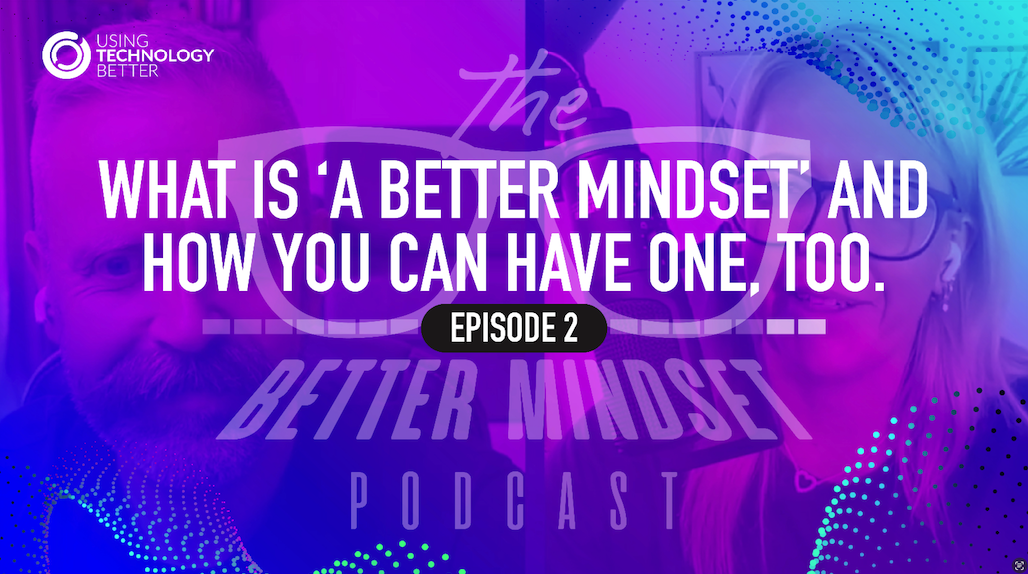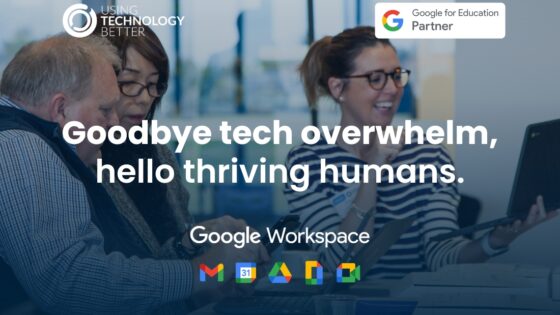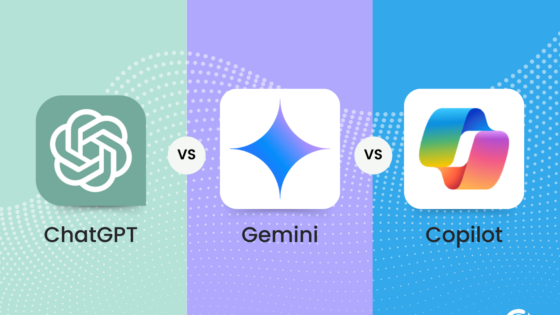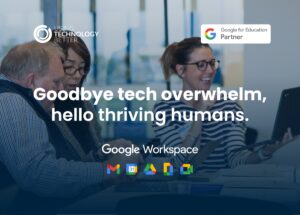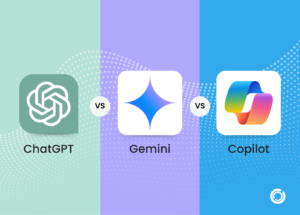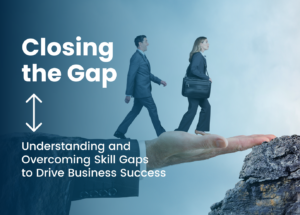This week we unpack just what ‘A Better Mindset’ is; why the title and how it can add value to us and the people we work and live with. Mark and Bex explore the way our world view, perspectives and approach to live can be hard-wired but also a learned behaviour. Kelly gives us some updates to some google tools you’re going to want to check out and the Making Waves segment explores the value of goal setting through a word or theme for the year!
Here are the links or resources that we’ve mentioned today:
1. The Working Genius – Patrick Lencioni
2. Google Tools for In-Person Learning
3. Start with Why – Simon Sinek
We post every week and would love to have you keep up with us. If you know someone who would get value from these episodes, hit the share button and let them know. Lastly, if you have questions or anything to share with us, email us at team@usingtechnologybetter.com or follow us on Instagram at @usingtechnologybetter or on youtube.com/@utb
We’d love to hear from you! See you next week.
Chapters:
Podcast Transcript Podcast Below
Mark Herring: 0:00
You know, when you’re coming up with a podcast, and you really want to be able to connect and have conversations around a theme, we talk about leadership, technology, and teaching. Those are really our three big sort of pillars or themes. And the way that we’re tying all those together is this whole idea of being better. So always trying to, to do better to look for better to improve and enhance what we’re doing. The better mindset podcast. Welcome to the better mindset podcast episode number two, I’m Mark Herring, and I’m dextrose conversations about leadership, learning and educational technologies. On today’s episode, we chat about a different approach to goal setting for your year a little bit different from last episode, BEX and I are your special guests as we unpack what makes a bit of mindset and whether some people are just wired that way. And Kelly is going to share a small but game-changing approach to Google Docs. Alright picks the making waves segment, I quite like this, this approach because what we’re going to try and do this little in this little segment is focused on a big idea or a trend or something that we think is quite timely, you know, just try to unpack something between the two of us. And it’s the beginning of January. So that for a lot of leaders and teachers and schools, you’ve got some reflection time, you’ve got some time to be able to just really unpack what your year has been like looking back, resetting a few things, and then maybe looking forward. So my approach with this is a little bit different from episode one. So in episode one, we had Mike starting to look at as a guest, and we had a director looking at how to set goals across the school. And that’s still definitely you know, something that we really recommend the schools do, obviously, goal setting is a huge part of success as a leader and in your classroom, you want to be able to have some goals with the students. But the big idea that I wanted to unpack is this, this idea of instead of setting goals actually having a word for the year. And it’s something that I first heard probably about six or seven years ago, there was a friend of mine who was teaching as a DP and a school. And they were really are one of those schools that were they were developing model learning environments. They were doing a lot of collaborative practice. And so professional learning was really big for them. And she told me on Twitter, actually, we just connected on Twitter, and she said, Oh, we’ve got a word for the year. And she shared what that was. And that was the first time I’d heard of that concept. Yeah, this is and I know that this is something that you’ve talked about before, as well, haven’t you?
Bex Rose: 2:26
Absolutely. And I think is something it’s that it’s that grounding, anchoring thing that we’ve mentioned before. Something that you always bring it all back to so rather than go, I’m gonna do this, I’m gonna do this, I’m gonna do this, I’m gonna do this, and you kind of just treading water the whole time, you’re actually really digging deep into some sort of concept that you really want to target and your life. And funny, Mark and I are generally on the same page on most things, and funnily that he should bring this up is because I downloaded this exact thing for me to do for this year as well. This weekend, so yeah, so on the same page, Mark, love it.
Mark Herring: 3:03
You call it the universe talking? Yeah, exactly. Yeah. So there’s a couple of, there’s a couple of ideas, I guess, things that I’ve been thinking about that make the word for the year work really well. And, you know, it’d be interesting to hear what other people think about this as well. And this is an approach that they’ve used before, if it’s the first time, these are some of the things that we think might help you work with that. So the first thing is, I would recommend find a word that is going to connect with you both professionally and personally. So one of the things that I think has become quite in vogue is kind of separating your personal and professional life, you know, this demarcation, and while I’m all for boundaries, I think you definitely need to have boundaries in your work life. I think, you know, for me, it’s much more healthy to think of myself as a in a holistic way. So thinking about me at work, and at home, I’m the same person, you know, like, technically, I shouldn’t be the same person, you adapt in different ways. But what I’m trying to develop for myself professionally, should really make some connection in my personal life as well, because then I think the two to start to tie together and then you’re starting to see yourself as a whole and it’s not, you know, kind of broken down into parts. This the second thing and I think one of the things that would help define the professional and the personal is really unpack the why behind your word. So if you’ve got a key word that you’re working on, and that’s your word for the year, that why behind it is really critical, because number one that’ll help you sustain it right when things get hard, or maybe you lose track or you forget about it. But having that or it gets hard. That’s the other thing, but really the why behind it just gives you a whole sense of purpose and a sense of mission behind what you’re gonna do and it just helps to motivate you. I’m one of those people need to be motivated to do something like by a greater cause. I don’t know you’re the same, actually. Yeah.
Bex Rose: 4:55
Should we go through Can I can I suggest some words maybe Yeah, yeah. There are some I’ve got my phone here because I’ve got, I uploaded a couple of pictures of words of the year. Now, these can be easily found on the internet. So if you just type in Word of the Year ideas, but some of the top ones here are things like focus, grow, organize. I think my kids need that one. Personal, simplify, simplify your life. Mine last year was gratitude. grateful for all the opportunities thrown this way. It’s something that I guess it just makes you look at world in a different way when you start being grateful for opportunities, and events and challenges. These other ones like, mindful, considerate, calm. Yeah, might be mine for next year. I think. Positivity respects. Appreciate enlightened. So there’s heaps and heaps of ideas. But if you have that central focus that really helps you dig deep into making decisions across your life actively engaging a mindset. Yeah, I actually really like that one calm, I think that needs to be you know, without the last couple of years have just been. So all I can picture in my head right now is like waves crashing like one thing after another one thing after another. So just getting into that sense. And it’s funny, because when I was down on my favorite place in the whole world, fundamentality other weekend, you can go there sometimes and the beach is absolutely crashing around crashing around. And then when I was there the other weekend, it was completely calm. And I was like, like, it just gave me that sense. So yeah, sorry, I digress a little bit there. Yeah, Mark. But yeah, there’s some ideas right there for you.
Mark Herring: 6:47
Yeah, yeah, well, exactly what you just did them when you thought of a word that resonated with a need, usually a word will come to your mind, because of something that you’d like to see yourself growing or develop or develop a strength around. You know, I think that’s that’s one of the things so the other the other I guess advice, I’d say, for people who are thinking about a word is to develop that word in your summer break, if you’ve got a holiday time, or even in the weekends, or evenings with someone that you trust, you know, whether it’s a partner or someone, someone close a good friend, and just unpack it verbally. So just go through what you think the word might be, and why it is because they, you know, a lot of neurologists will say this research that says there’s 1000s of words that float around in our brain at any particular time, or 1000s of thoughts. They say that the average person has about 6000 thoughts a day. And so all of that if you think about all the thoughts you’ve had over the last year, there’s a lot going on for us. And in our summer period, this is a time for you to be able to distill that down and just talk it out. And so the juxtaposition is a good word for a summer break between how many thoughts you’ve got and how many words you can say the 6000 thoughts, you might have a particular day, but we can only speak 125 words a minute, usually, I think Kiwis New Zealanders tend to speak a little bit faster. But the more you talk and the more you get those words out, it’s kind of like getting all of those words in that washing machine that’s in your brain and actually filter it out through, you know, through verbally with somebody and I’m a real thinker while I talk. So I have to verbalize in process and unpack what I’m what I’m saying at the same time. So that’s really important. Yeah, so
Bex Rose: 8:26
that accountability too, is that when you start talking to people about your word, then people go how’s that word going? And you go, alright, I heard that word. I’ve got to be calm.
Mark Herring: 8:35
Yeah, or even make it part of like if your social media part of your bio word for the year, semicolon. Or have it on your planning. Like if you’re a teacher who’s got planning, you have it at the top of your planning and actually distill that word out and maybe unpack it a little bit into a statement. Great idea. Yeah, lots of different things you can do. I’ll tell you my word for that. So you’re just calm. You think yours is calm?
Bex Rose: 8:56
I think that’s where I’m gonna hit to. Yep, yep.
Mark Herring: 8:59
Yeah, mine’s build. So what I’m, what I’m really keen to be able to do is just build some skills and a development phase for me, like, I’d really like to continue to grow in my leadership development and a few other different areas. But I know also, for my wife, she’s an illustrator, and there’s some things that she’d like to build in that and I’m gonna, you know, help her out in that area. So we’re going to really see, I think that there could be another little last tip as well, you know, do it as a couple if you’re, if you’re, if you’ve got a partner,
Bex Rose: 9:28
I’m gonna ask that. So you both you’re both gonna use that word I Yep. So you can hold each other up account? Yeah.
Mark Herring: 9:34
Yeah. I don’t know if she’s, yes. I don’t know if she’s, we haven’t talked about it too much. But I was just talking to her about this morning, because this is obviously the another big thing that we’re going to be talking about this morning. So yeah, with there’s a lot of things that we want to build, you know, kind of looking forward for us into the future. So there you go. So that’s the big idea. Yeah, like you said, if you want to unpack what that looks like, and maybe get a few more ideas, there’s lots of things on the internet that talk about that. from a teaching perspective and from a labor perspective, you know, whatever you’re doing, check it out. Alright, guest on the show episode two, we’ve actually decided that you and I are going to be the guest on the show. So what we what we thought would be quite good for, for us to be able to have a conversation about would be the whole concept of the better mindset podcast what what does a better mindset mean? And we’re going to dive into a few little topics around that. But what I thought I’d just unpack is really the whole idea of better, you know, when you’re coming up with a podcast, and you really want to be able to connect and have conversations around a theme, we talk about leadership, technology, and teaching, those are really our three big sort of pillars or themes. And the way that we’re tying all those together is this whole idea of being better. So always trying to, to do better to look for better to improve and enhance what we’re doing. And so that’s really the whole energy dress, really, that’s kind of the the bit of mindset approach. It’s kind of like a lens or a pair of glasses that you’re looking through all the time, isn’t it? And I think, you know, making the connection between that and using technology bitters, one of our core values is make it better, which is really a really nice way it’s in our name. It’s one of our core values. It’s something that we do and so every school that we engage with every teacher, every business, everything that we’re doing, we’re always trying to improve things and make them better. So I want to just ask a couple of questions about that, and just have a little unpack a couple of questions. The first one is, is really around this whole idea of why we think there are, you know, there are some people who are really engaged and attuned to see the things that need to be improved. They’re kind of always seeking for better and why some people aren’t. I’m wondering if you’ve got any thoughts about that? And we could start with it. Why do some people just naturally feel attune to wanting to make things better?
Bex Rose: 11:56
It’s a big question. I think. I think I might just dial it back a little bit is that I might not have always been this way. I am a massive fan of neuroplasticity, because I am a product of it. So historically, I guess when I was a teen, and when I was a kid, I didn’t look at things to be better. I was always the negative Nancy. I was always thought the world was against me. I thought it was the word. Yeah, things always went wrong for me. Of course it is. Because that’s how I’m that wasn’t my catchphrase. Of course, that will happen to me, you know, that kind of thing. And as I’ve grown in, both in my career, my leadership, my life, I have actively changed the way I’ve thought and my mindset. So I have really worked on building a better mindset and a more positive mindset. I’ve done a lot of learning around it. And I feel like I am a product of, of neuroplasticity, I’ve been able to change my mindset. So I can see for the things that are better. One of the key things that I guess I’ve always had, in the back of my mind is all it takes is 1% better every day, it doesn’t have to be a massive mind shift, it can be something that you do one tiny thing, like what we’ve talked about in the habits and episode. One 1% Better can equate to something massive by the end of the year. Yeah. So whether that be exercise, whether that be how you view challenges in life, if you change something small, that can amount and compound and do something big.
Mark Herring: 13:40
Yeah, yeah. And that’s what I think personally, for me, too, I think back, you know, in, I guess everybody changes as they grow. But, you know, my life, we moved around a lot as a kid. So we were always in the state of change that were and that was one of the things that was just a constant in my life. The family was always, you know, very stable and very secure. But that kind of change mentality, it was all I saw it as an opportunity to make things different and better every time we moved. So, you know, it’s like, oh, great, you know, I get to have a new, a new bedroom, and I get to make my bedroom better. And then, you know, the schoolwork I could kind of be better as a person when I get to a new school and all those types of things. So I kind of grew up in this ecosystem or this incubator, where I felt like I had opportunities to improve and develop and grow kind of like you. Yeah, it’s interesting to sort of look at your own background and see how that has shaped you and what you’re doing now. But it’s like I think you can definitely change and become much more as somebody who’s who’s got that mindset where they always want to improve and, and I think some people have that more than others. I think for me, it’s definitely been a process but so it’s just the way I’m wired. Like I think, you know, if you ask my wife, we’ve we’ve done some discovery over the last few years, and she has come to recognize the things that really ticked her off are the things that make me great at my job. So I’ll explain. So So one of the things that she gets sick of is me always telling her things that she could improve or, you know, spotting things that she could be doing better, you know, because every, every spouse wants to hear that from their partner, right. And there’s a situation that came up recently where we run, and we like to run together. And I, she had told me, you know, you need to stop telling me to do things, you know, like, I’m quite happy the way I do things. You know, she has a strong personality. She’s quiet, but she’s very, yeah, very, you know, very secure. And I saw that she wasn’t tying your shoelaces very well. There’s a waiter? Well, I don’t know, you can actually Google it. So it’s, there’s a YouTube video, and there’s a way to tie your shoelaces that apparently they get one to 2% like people who are speed runners, you know, races, you can get into, you know, it’s totally not. But there’s a way that you tie your shoelaces, where you can actually lock the the heel down a lot better, and you get much more distributed tension across the lace. I tried to tell her that one time, and it just became one of those funny things where she’s like, you know, you’re even trying to tell me how to lace my shoes better.
Bex Rose: 16:18
Do you know what Mark, I think this is going to bring me to something that we really want to talk about. When when we are learning and growing and trying to you know, be better. There are frameworks that can help you clarify this, right. So just then, which is not something that I would have thought of you being much better of discerning. Right, so. So we we’ve talked about, I’m gonna I’m gonna jump ahead of you on this, because this is something I’m very passionate about. But it definitely has changed my life. We have mentioned it before the working genius, and the working genius for me. Oh, my goodness, it was like it opened up this whole appreciation for other people. Okay, so I found out cool. I’m a galvanizers. Sorry, I’ve just been my head. I’m a galvanizers. I’m I when I find something that I want, that I think is awesome. I want to share it with everyone. I want to get everyone excited about it. I get the right people in the right places. And go ahead, right. That’s really cool. When I learned that about me, I was like, yep, piccies that’s me. Okay. But what it does, what the what the framework did for me was appreciate things that may have used to frustrate me about other people, right? So so for example, that that discernment that you potentially were doing, we’re talking about the shoe laces and trying to say, hey, maybe this is a different way, or this might be a better way of doing it. Sometimes I used to sit in staff meetings and be like, for goodness sake, can we just I this is a great idea, because I’m ideation is also one of my geniuses. I’d be like, desk, let’s do this. And someone go, oh, did you think about this? Yeah. And I go off, for goodness sake. But now I’m like, I need that person. Because if I hadn’t, if I hadn’t heard those what ifs, we might, we might be left with a dud product. So I guess we’re how I’m getting back to that is, I’m i feel like i It’s been a mindset for me, because I look at other people and go, that might have frustrated me a couple years back, but I can totally I totally appreciate that part of your personality.
Mark Herring: 18:27
Yeah, yeah. And I think that’s one of the key ideas about about always trying to make things better is that everybody’s got a different role to play in that aye? So just for those listening, if you haven’t come across the working genius, you can look it up, it’s workinggenius.com. Patrick Lencioni has developed this idea with the table group as a group of thought leaders that he works with and his company have devised an AI an idea or framework with their six geniuses. And everybody has at least two of those. And so they go through a bit of a process. Or there can be a Productivity Process that you can take things through with as wonder, invention, discernment, galvanizing, enablement, and tenacity and I’ve sort of memorized those over the last year that we’ve been working with, with schools and using it internally in our company as well. And I think that’s sort of one of the questions that I wanted to kind of flesh out in this conversation. When you’re thinking about some people being more wired to a better mindset than others. I think there are some personality types and some people who’ve got certain types of geniuses that do fit with seeing opportunities and instigating change and things that need to be improved than others, you know. And in the in the working genius framework, one of the things that they talk about is there are some there are some people who are wired to be disruptors. And then some people who are wired to be responders. I think that’s the way they phrase the second part. So my, my my working genius is a wonder and invention. So I’m often asking big questions. I’m often coming up with ideas that then prompt some change or some opportunities for change and it’s the people who are you know, More around the enablement and tenacity, they’re responding to the disruptors that, you know, the disruptions that I’m suggesting. So when you’ve got a lens that’s looking for things to improve and looking for ways to make things better, then there are other people involved in that process that can, can kind of move that through. But yeah, it’s interesting that, you know, personality types, the way you’re wired, or, or those types of things that they, they just make you appreciate everybody in that whole process, don’t they, you know, in the fact that everybody’s got a part to play. And that,
Bex Rose: 20:32
and I think it’s just that constant learning, and just just keep, keep learning. I think that a lot of strategic plans, and a lot of visions, and a lot of mottos and school is, is to grow the learner, you know, like the ongoing learner, what’s the word? I’m looking for? Mark? Like, just that just?
Mark Herring: 20:51
Yeah, lifelong learners, and those lifelong learners.
Bex Rose: 20:57
Lifelong learners. Exactly right. And, and to really embody that is, is where the sweet spot is, right? So if you just keep on learning, and keep on being open to shifting that mindset to make it better. That’s where the sweet spot is. And I think that, yeah, that’s something really important and to go through 2023 with is just be open to learning. And, of course, at the moment, the change in the world is just rapid after COVID and lock downs and AI and all the things that are coming in and just being open that to enable your life to be better through change. So yeah, having that open mindset
Mark Herring: 21:38
to learning, right? Yeah. Yeah, it’s, it’s, it’s a really important perspective to have, isn’t it? You know, for anybody, I wonder, too, like, for some of us, there are some of us who are wired, to always be looking for the improvement, I think there’s, there’s kind of two ends of the spectrum, there’s the one extreme, there are the people who are always looking for opportunities to improve things. And I can tend to fall into that opportunity, that that kind of mindset, but then there are other people who are, you know, at the other end, and that is quite happy for things to say the same, you know, like, they just, they like stability, they like structure, they don’t want things to change, and they’re very, you know, quite happy to stay there and just keep things ticking over. I wonder if the challenge for us moving into a new year is for us to be able to get a bit more of a balance, maybe not not to totally changed the way that we see things, because I think we’re all wired and we all have a contribution to make. But for people like me, you know, if I’m constantly always looking to improve things, then that means that I don’t enjoy what we’ve got, and don’t appreciate, you know, and feel gratitude for, for where we are and what we’re what we’re doing and what we’re achieving. I wonder what would you say to the people who are kind of quite happy with where they are? What would you say the little shift would be that they could make,
Bex Rose: 22:50
to move into to making it better?
Mark Herring: 22:53
Yeah, to move. But what could they do to move a little bit more towards a better mindset?
Bex Rose: 22:58
I think it’s surrounding yourself with the right people as well. Something I really want to dig deep into the podcasts in the next couple of episodes, surrounding yourself with people that that you may be aspire to have the same sort of mindset, as I would challenge people to learn something new, because that or whatever it is, whatever it is, you’ll face challenge, because you’ll go into the the pit where you go, Oh, I don’t even know what this is talking about. I don’t know how to do this. And then you’ll start gradually going back up the other side of the learning pit and start having those new learnings in your your growth just from that challenge of learning something new, no matter what it is. That would be my challenge to people learn something new.
Mark Herring: 23:43
Fantastic. And no better time to do that when we’ve got a summer break. And we’re, we’ve got some times on the beach or if you’re in the northern hemisphere, you’ve you’ve got a little bit of christmas holiday time, just to be able to unpack at the start of the new semester. So yeah, good challenges there about having a bit of bit of mindset graduate. Well, this is a segment where we get to have a look at some new tools, we are finding out some new things that are happening, which is quite timely for the beginning of the year. And we’re coming into a new year, especially if you’re in the Google workspaces environment. We’re in your school. We’ve got Kelly, good to have Kelly here. Kelly is one of our trainers in New Zealand, and is a Google Certified Trainer, which is fantastic. Tell us what we’ve got Kelly,
Kelly Kenyon: 24:24
what’s on thanks for having me. So today, I thought I’d run through a few of the updates that I personally got from Google last week. So the hot off the press. So the first one I thought I’d run through with you is that Google have upped the Google for Education website. They’ve done a big sort of rollout of new products. And so if you end up going to I just normally Google Google for Education, it’s the first website that pops up. And if you go to the for educators thing at the top, and then over the left hand side, you’ve got these things called product guides. So these will guide you through all of the different products from Google And there are some training courses and stuff in here as well. So some really cool updates inside the actual Google website. They also have a new product called in person learning, which is a small little course that you can jump into, particularly if you’ve had a lot of kids that have either been hybrid learning, or they you’ve had quite a few kids that haven’t actually come back full time into your classroom, you can jump in here some real cool tips and tricks on how to really reengage them and back into your classroom in person.
Mark Herring: 25:32
So secret things for teachers to be doing, you know, you’ve got a little bit of time off before things start ramping up. And you’re kind of, you know, your kids are at the beach, and you’ve got a little quiet time to spend this. This could be a good a good platform to go and just do a little bit of in person learning really, isn’t it? Yep. Yeah,
Kelly Kenyon: 25:48
yeah, just you know, you might want to find something neat and engaging to to help your class when you come back and the new year. So yeah, there’ll be a few things on there for you. Awesome. And then my most exciting update, which I’ve been waiting for this for ages, is that now in Google Docs, with tables, so when I insert a table, normally, I would have had to, for thought, how many cells I wanted, across and down and then be able to merge them to create the cells that I wanted, because you weren’t originally allowed to split them. But now you can actually split them. Cut it out.
Mark Herring: 26:27
Are you kidding me?
Kelly Kenyon: 26:32
So when I insert a table, I don’t have to think ahead about how many cells I want, because I can actually split them, which is really cool. I can right click on a
Mark Herring: 26:48
file. That’s one of those things that is quite a small little addition to whatever algorithm they’ve got running in the background of Google Docs. But it does make a huge difference for teachers. I’m a teacher, why would I care? Tell me why I care about that.
Kelly Kenyon: 27:02
So when I was teaching, I use tables for everything for my planning templates for kids worksheets. For just like graphic organizers. They’re real quick and easy just to like insert a table into a doc, share it with your class, and get them to input information. But every now and then you need to split something into because you’ve got too many things in one cell. So you want to split it into two. And you can really quickly easily split your information now and just copy and paste what you need on either side of that split cell.
Mark Herring: 27:31
Yeah, that’s right. If you’re a PE administrator, and you’re organizing rosters and timetables and those types of things as well, there’s a lot of uses for that it’s it’s isn’t a funny, big sale, like something small like that can just totally changed the way that you’re working. Because up until now, you had to create your table, like you were saying, and then and then you’d sort of be like, I have to start again. Because you
Bex Rose: 27:53
just want to add in the egg. Google’s really good at listening to check wanting changes that people want to have made. So as it down to the bottom right hand corner, Kelly, my right there. If you see something that isn’t there that you want there, click on the little bottom button at the bottom. And it should say what does it say Kelly?
Kelly Kenyon: 28:12
No, you don’t have one and tape
Bex Rose: 28:15
helpline. Yeah. And you can go improve And you can add in your suggestions there. And they do literally listen to you. So if you think that it’s something that’s really important, get your friends to write it too. And they’ll see the same thing coming through. And they do make changes according to your suggestions. So just a little tip there, Google do listen to you. They’ve got a team of people that are dedicated to looking at those suggestions, and they make the update. So there must have been a bunch of people that said, Hey, why are there no split cells in here? And then they’ve made the change accordingly. So that’s just a little tip there. And Google?
Kelly Kenyon: 28:51
Yeah, like the more people jump on and do the same thing that they want changed, the higher up Google’s list that goes. So a lot of people asked for Taddeo to be part of the Translate within Google and became part of the Translate within Google. So So yeah, so a lot of people currently, like wanting groups in Google Classroom. So if you want to go to go and ask for it, it’s just not going to happen with you thinking about that.
Mark Herring: 29:19
Yeah, that’s probably a great tip as well. And so if you’re using Google workspaces with students, and this goes for any platform, whether it’s Apple or Microsoft, as well, getting them engaged, like having them come up with ideas of things that they could do to improve the tools, that’s that whole better mindset, isn’t it because you’re actually engaging the students in that process as well. So there’s another little tip that you could do, you know, getting students engaged with, you know, suggesting things to Google, it just helps them feel like they’re connected to an online community and they’re part of the whole process of the tools being developed, you know, further down the track so that’s really cool. Thanks, Kelly. Great, great little tip there. I think everybody’s going to be running out now and creating little cells and and different things like that on the on the Tables. That’s awesome. Thanks for sharing.
Bex Rose: 30:02
Thanks for having me. Thanks, Kelly.
Mark Herring: 30:06
Well, that’s it for another episode, next episode to what did you think
Bex Rose: 30:10
I’m just loving this, I love having these chats, I loved hearing about the word of the year and what your Word of the Year is. And I and I put the challenge out there to all the listeners to think of their couple of words and talk with their fan and friends and family around what they might want to achieve throughout the year. I also do challenge you to go and try something new. And just observe your mindset in that in that time, how you feel, what what are the thoughts that are coming to your head, because that’s a really good starting point of working on building a better mindset. And just that last thing with Kelly’s upskilling us and her spotlight session with this with the split cells, just thinking about, the reason behind us having that spotlight is to build your efficiency in your classroom or in your practice of whatever practice you are. So building your efficiency in a tool enables you to have a better well being have better well being being able to do things faster. And more efficiently is, is all to make you better as a as an educator or practitioner as well. So just a bit of background while we pop those in there.
Mark Herring: 31:16
You’re fantastic. It really does help you feel like you’ve got confidence and mastery of the tools, you’ve got two dozen. That’s great. So if you’re after some of the links or resources that we’ve mentioned today, whether it’s the working genius, you know, some of the Google resources, there’s lots of different things that we mentioned, we’ll put those in the show notes for you. And make sure that you subscribe just to make sure that we don’t miss anything we’re trying to where our aim this year is to publish every every week. So we’d love for you to be able to keep up with those episodes that come out. If you know somebody who would get value from some of those episodes, we’d love you to share that with them. Whether it’s anything in the content or something coming up in the future. We’d love for you to share them and let people know about what we’re doing. Lastly, if you’ve got any questions or anything to share with us, we are really going to value your feedback. And we’re looking forward to hearing from you you can email us at team at using technology better.com. We’d love to hear from you. And we will see you on the next episode. See ya!



